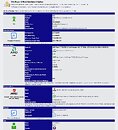- Joined
- Oct 9, 2007
- Messages
- 47,878 (7.38/day)
- Location
- Dublin, Ireland
| System Name | RBMK-1000 |
|---|---|
| Processor | AMD Ryzen 7 5700G |
| Motherboard | Gigabyte B550 AORUS Elite V2 |
| Cooling | DeepCool Gammax L240 V2 |
| Memory | 2x 16GB DDR4-3200 |
| Video Card(s) | Galax RTX 4070 Ti EX |
| Storage | Samsung 990 1TB |
| Display(s) | BenQ 1440p 60 Hz 27-inch |
| Case | Corsair Carbide 100R |
| Audio Device(s) | ASUS SupremeFX S1220A |
| Power Supply | Cooler Master MWE Gold 650W |
| Mouse | ASUS ROG Strix Impact |
| Keyboard | Gamdias Hermes E2 |
| Software | Windows 11 Pro |
AMD's hotly anticipated gaming CPU, the Ryzen 7 7800X3D "Zen 4," which launches early-April, is beginning to show up in online benchmark databases. The 8-core/16-thread processor has 64 MB of 3D Vertical Cache, which takes its L3 cache size up to an impressive 96 MB, and total cache up to 104 MB. The chip is showing up on the SiSoftware SANDRA online database, where it was tested on an MSI MEG X670E Ace motherboard. It obtained a score of 395.07 GOPS, with 527.56 GIPS dhrystone INT, 552.04 GIPS dhrystone long; 316 GFLOP/s whetstone single-precision floating point, and 264.71 GFLOP/s whetstone double-precision floating point.
The score puts it at roughly 37% faster than the Ryzen 7 5800X3D "Zen 3," although it's somewhere between its other 8-core "Zen 4" compatriots, the 7700X and 7700. The 7800X3D, much like its predecessor, is expected to perform either on-par or slightly worse than the 7700X in frequency/IPC dependent "lightweight" tasks, but zoom past in cache-favoring workloads such as gaming. Its predecessor, the 5800X3D, beat the fastest Intel processor of its time, the i9-12900K, so the 7800X3D has its task cut out—to beat the i9-13900K in gaming.

View at TechPowerUp Main Site | Source
The score puts it at roughly 37% faster than the Ryzen 7 5800X3D "Zen 3," although it's somewhere between its other 8-core "Zen 4" compatriots, the 7700X and 7700. The 7800X3D, much like its predecessor, is expected to perform either on-par or slightly worse than the 7700X in frequency/IPC dependent "lightweight" tasks, but zoom past in cache-favoring workloads such as gaming. Its predecessor, the 5800X3D, beat the fastest Intel processor of its time, the i9-12900K, so the 7800X3D has its task cut out—to beat the i9-13900K in gaming.

View at TechPowerUp Main Site | Source






